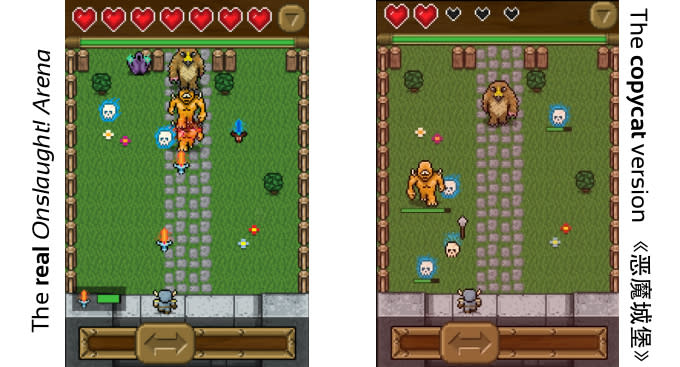How to Stop Chinese Copycats from Stealing Your App
On Monday, my colleague Steven wrote about a cool new gaming platform inside of WeChat, and in the comments the estimable Serkan Toto rightfully pointed out that one of the games looked an awful lot like Onslaught! Defense. And by "looked an awful lot like" I mean "obviously was a direct copy of." The screenshot comparison below should make it pretty obvious that the Chinese game (called Demon Castle ) was basically a copy-paste job.

Update: The game on the left in the image above is actually Onslaught! Defense, not Onslaught! Arena. So, as is my standard operating procedure in these situations, I sent an email to the developers of the original game (Onslaught) and another to the folks behind the DuoPao platform that Demon Castle was hosted on. I haven't yet heard back from the Onslaught devs, but a DuoPao representative got back to me very quickly with this message:
The games on our platform are provided by third parties. We will thoroughly investigate the situation you have informed us of, and if there is a case of piracy, rights-infringement, or unhealthy content we will handle the situation by removing the game as quickly as possible.
Then, scarcely an hour later, I got this message:
Thank you for your feedback; we have removed the game from our platform.
And indeed they had. Although as of this writing you can still play it here if you've bookmarked that direct link, the game has already been delisted from DuoPao platform and DuoPao has informed us that link will be dismantled within 24 hours. Over the past year, this sort of thing has happened with some frequency. When Chinese developers copied the web game Cloudstone and put it onto Tencent's gaming platforms, we pressured Tencent for a comment and not long after the copied game suddenly disappeared. When a Chinese net user copied and began selling the Impact game engine, we got in touch with both the site admin and the website's hosting service for comment, and within a few days the site had been taken down. When I noticed a Chinese media startup had aped the New Zealand Listener's website design, I got in touch for comment and the site suddenly went dark. I hope I'm not overstating my own importance here, but I don't think it's a coincidence that many of these copycats shut down within a few days of getting an email titled "Media Request for Comment" in their inboxes. It seems that many smaller-scale copycats would prefer to operate in the shadows, and when someone threatens to shine a light on what they're doing, they simply cut bait and run. Similarly, the platforms these copycat apps and games use for exposure are often run by legitimate companies like Tencent that have plenty of legitimate games to offer and no real reason to protect the copycats on their sites, especially when the media comes calling. And while I think we've built up a good rep here at Tech in Asia, we obviously don't have the name recognition of, say, the Wall Street Journal. An email from one of those guys is probably even more likely to result in copycats getting dismantled. So how can you stop Chinese copycats when you discover your game or app has been copied? Email someone in the press. If you find out someone has stolen your app, I'm always game to try to track them down and get a comment, and I'm sure many other tech reporters feel the same way. (I said "Chinese copycats" in the title because in all of the examples I mention above, the copycats were Chinese, but my guess is that this approach could be somewhat effective in eliminating copycats from any country, not just the PRC.) Of course, using the media to eliminate copycats isn't a silver bullet -- there will always be some that are too shameless or too difficult to track and shut down. But it's a good first option for anyone who discovers their app has been copied because it is free and, at least in my experience, the results can come pretty quickly. So, if your app has been copied, consider dropping us a line (editors at techinasia dot com). We're always interested in new stories and we might just be able to help you.
The post How to Stop Chinese Copycats from Stealing Your App appeared first on Tech in Asia.

 Yahoo Finance
Yahoo Finance 
